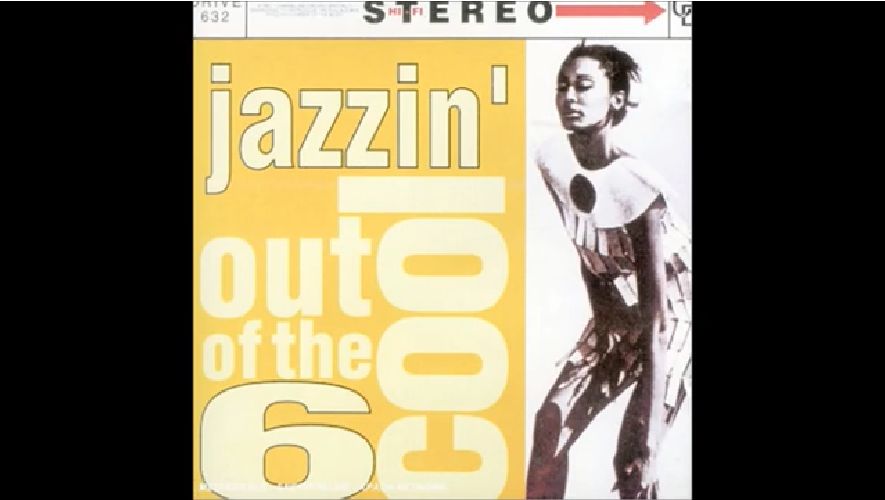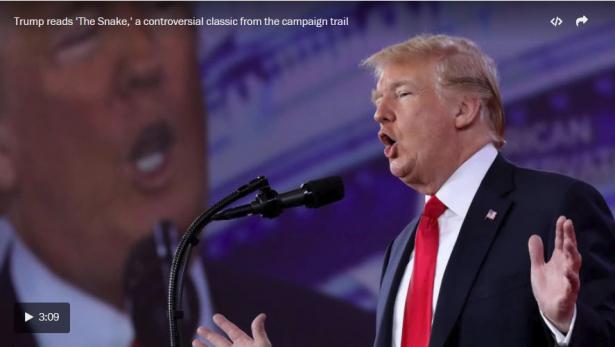‘The Snake’: How Trump Appropriated a Radical Black Singer’s Lyrics for Immigration Fearmongering
One of President Trump’s earliest documented uses of “The Snake” came in January 2016, on the eve of the primary season that he would go on to storm.
Speaking to a crowd in Cedar Falls, Iowa, with the state’s all-important caucus just days away, the candidate put on reading glasses and read the story from a piece of paper: A talking snake fatally bites a woman after she takes it in to give it care.
“I read this the other day, and I said, ‘Wow, that’s really amazing,’ ” Trump told the crowd.
Trump used the poem repeatedly on the campaign trail to illustrate the threats posed by refugees from Syria and other countries. The United States is the woman who naively gives others refuge; immigrants are the snakes who deliver the fatal strike.
“The Snake” was back this week after a hiatus, when Trump did another rendition during a freewheeling speech at the Conservative Political Action Conference on Friday.
For someone who is not known as a man of letters, this is one of Trump’s only literary touchstones. It is a crowd-pleaser, part xenophobic fearmongering, part tale told by Grandpa — “story time with Trump,” as one college supporter said that day in Iowa.
But the lyrics have a far more complex origin than Trump’s use might imply. The poem originated in the 1960s from a soul singer and social activist in Chicago, Oscar Brown Jr. Its appropriation as a tool to drum up fear about immigrants has turned heads; some of Brown’s family are asking Trump to stop using it. And now, people are reading deeper into the president’s fixation with the parable.
This is the story of the president and “The Snake.”
Trump’s take: An anti-immigrant tale
Trump’s performances of “The Snake” take on a relatively common routine. After listing the dangers of refugees, terrorism and “the wrong people” coming into our country, Trump will take out a piece of paper and display some of his showmanship, which is part carnival barker, part parent hoping to scare a child straight and part Fox News host.
“You ready?” He asked an adoring crowd in Ohio.
“Who likes ‘The Snake’?” he asked another group in Pennsylvania. “Has anybody heard ‘The Snake’? Not that many! Should I do it again?”
The poem describes the story of a snake, freezing outside in the cold, who convinces a woman to take him into her house. After the woman lets the snake in and revives it with “honey and some milk,” the snake delivers a fatal bite to her.
Trump likes to emphasize the last line, taking gusto as he repeats the snake’s words:
“ ‘Oh, shut up, silly woman!’ said the reptile with a grin. ‘You knew damn well I was a snake before you took me in,’ ” Trump will say, his voice often rising to a growl.
Usually, the crowd cheers. Other times, it breaks into a spontaneous chant of “U-S-A!” At CPAC, the audience gave Trump a standing ovation.
During the speech Friday, Trump tore into the gang MS-13 (“animals”), immigrants (“We pick out people. Then they turn out to be horrendous.”) and Democrats (“They’re always fighting for the criminal.”), among others.
And “The Snake” was given its usual sendup.
“Did anyone ever hear me do ‘The Snake’ during the campaign?” Trump inquired. “Because I had five people outside say, ‘Could you do “The Snake?” ‘ I said, ‘Well, people have heard it. Who hasn’t heard “The Snake?” ‘ ‘You should read it anyway.’ Let’s do it anyway.”
A song written by a black former communist
It is not entirely clear how the song found its way into Trump’s hands.
Corey Lewandowski, who served as Trump’s campaign manager for much of the primary season, told The Washington Post in 2016 that “somebody probably sent it in.”
“We get a lot of mail,” Lewandowski said, “but it does go to the larger narrative of what used to be the way, conceptually, our country was to where it is today.”
Trump might be surprised to learn the origin of the song. Long before he used it as an anti-immigrant poem, “The Snake” was just a simple tune, a parable open to interpretation.
The lyrics were written in the 1960s by Brown, an outspoken singer, songwriter, social activist and former Communist Party member from Chicago.

Click here to listen to Oscar Brown, Jr. perform "The Snake".
His work has been described as a celebration of black culture and a repudiation of racism. He wrote the lyrics for drummer Max Roach’s 1960 album “We Insist! Freedom Now Suite,” one of the first jazz records to deal heavily with the growing civil rights movement. Brown directed stage shows that cast gang members and other teens from poor neighborhoods in Chicago. And he created the musical adaptation of a play about a black militant leader that made it to Broadway with Muhammad Ali as the lead.
Brown, who died at 78 in 2005, wrote “The Snake” during a time in which he was performing regularly in nightclubs and writing songs that used biblical references and animal allegories for simple stories that held deeper meanings, two of his daughters, Maggie Brown, 55, and Africa Brown, 48, said in an interview.
“In African tradition, you would say a proverb and pass that down,” Africa Brown said. “That’s the way you teach people to live.”
Brown’s family has been harshly critical of the president’s appropriation of the song, and Maggie and Africa said they wished he would stop using it. In particular, they are upset by the fact that it has been repurposed to serve prejudice, saying that flies in the face of their father’s work.
“Of course it had nothing to do with prejudice or racist thoughts that he’s twisting it into,” Maggie said. “We always took it like, if you lay down with dogs, don’t expect not to wake up with fleas.”
Trump has also failed to credit Brown for the song, which the family takes as another slight. During one rally in Florida, Trump said it was written by the R&B singer, Al Wilson, who popularized the song in the “1990s.”
“It would have been nice if you credited him for his work,” Sidakarav Dasa, Brown’s grandson, wrote in a social media message to Trump in 2016, according to the Chicago Tribune, “but I can see how telling your crowd that you were quoting a man who resigned from the Communist Party in 1956, declaring himself ‘just too black to be red,’ might be problematic.”
Whereas Trump’s take is paranoid and dark, Wilson’s 1969 rendition, perhaps the song’s most famous version before Trump’s, is a bluesy soul number set over a punchy horn section.
The two Brown sisters said they found it ironic that their father — “a revolutionary, outspoken black man” who they believe was blacklisted by record labels and clubs for his political work in the ’60s — was enjoying a glancing sort of recognition through the song’s rebirth.
“They wanted to pull him down,” Maggie said. “Now they want to pull from his stuff.”
The question of when the soul song was first repurposed as an anti-immigrant wake-up call is murky. Internet searches show that the lyrics popped up a few times in the comment sections of fringe conservative websites in 2015 before Trump popularized it.
“No country has a moral obligation to take the snake that will kill it,” a commenter wrote that year on the anti-Muslim site Jihad Watch, along with the lyrics, which the commenter credited to a white singer who had covered the song.
A secondary meaning?
Trump’s use of the song shows no signs of stopping, though many, like Brown’s family, find his rendition hateful.
“Trumps snake story is vicious, disgraceful, utterly racist and profoundly Un-American,” conservative operative Steve Schmidt wrote on Twitter after CPAC on Friday. “That this is how an American President speaks of immigration is a tragedy. This crowd of cheering extremists are the heirs of the Know-Nothing’s and nativists that have always plagued us.”
And the president’s fixation on the poem, which is rarely, if ever, a scripted part of his speeches, has led some to wonder whether there is a deeper meaning beyond its stated purpose about dangerous immigrants.
A theory has emerged among some commentators that Trump’s love affair with the poem represents a subconscious confession: The president identifies with the snake.
“Historians will view it as obvious that Trump was describing himself in ‘The Snake,’ ” Dan Lavoie, an aide to Democratic New York Attorney General Eric Schneiderman, wrote on Friday. “His over-the-top recitation will be the narrative device for the first big post-Trump documentary. And they’ll think we’re all so dumb for not recognizing it in real-time.”
Josh Marshall, the liberal editor in chief of Talking Points Memo, called Trump’s use of the poem “some weird psycho-sexual” thing that “must appeal to Trump on like ten levels and also appeal to bible literalists.”
Trump has flippantly dismissed the criticism.
“If you say, ‘Isn’t that terrible,’ ” Trump told the crowd at CPAC, “who cares?”
Lyrics
On her way to work one morning
Down the path alongside the lake
A tenderhearted woman saw a poor half-frozen snake
His pretty colored skin had been all frosted with the dew
“Oh well,” she cried, “I’ll take you in and I’ll take care of you”
“Take me in oh tender woman
Take me in, for heaven’s sake
Take me in oh tender woman,” sighed the snake
She wrapped him up all cozy in a curvature of silk
And then laid him by the fireside with some honey and some milk
Now she hurried home from work that night as soon as she arrived
She found that pretty snake she’d taken in had been revived
“Take me in, oh tender woman
Take me in, for heaven’s sake
Take me in oh tender woman,” sighed the snake
Now she clutched him to her bosom, “You’re so beautiful,” she cried
“But if I hadn’t brought you in by now you might have died”
Now she stroked his pretty skin and then she kissed and held him tight
But instead of saying thanks, that snake gave her a vicious bite
“Take me in, oh tender woman
Take me in, for heaven’s sake
Take me in oh tender woman,” sighed the snake
“I saved you,” cried that woman
“And you’ve bit me even, why?
You know your bite is poisonous and now I’m going to die”
“Oh shut up, silly woman,” said the reptile with a grin
“You knew damn well I was a snake before you took me in
“Take me in, oh tender woman
Take me in, for heaven’s sake
Take me in oh tender woman,” sighed the snake
Jenna Johnson and Dan Balz contributed to this report.
Eli Rosenberg is a reporter on The Washington Post's General Assignment team. He can be reached at eli.rosenberg@washpost.com.


Spread the word